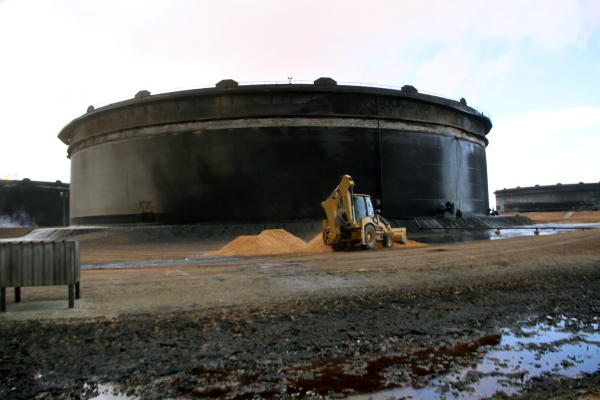Forces loyal to east Libyan commander Khalifa Haftar on Sunday seized at least two key oil ports from a rival force loyal to the U.N.-backed government, risking a new conflict over the OPEC nation’s resources.
Ahmed al-Mismari, a spokesman for Haftar’s self-styled Libyan National Army (LNA), said its fighters seized control of Es Sider, Ras Lanuf and Brega, but still faced resistance at the port of Zueitina and around the nearby town of Ajdabiya.
The attacks on Libya’s major oil ports by Haftar, who opposes the U.N.-backed Government of National Accord (GNA), pushes the North African state towards a broader battle over its oil resources and disrupts attempts to restart production.
Armed conflict, political disputes and militant attacks have reduced Libya’s oil production to about 200,000 barrels per day (bpd) from 1.6 million bpd it was producing before an uprising toppled Muammar Gaddafi in 2011.
Haftar, a former army general who has been a divisive figure in Libya since Gaddafi was toppled, has resisted attempts to integrate him into unified armed forces and overcome divisions between the east and west regions.
Many in western Libya and Tripoli criticize Haftar as a former Gaddafi ally bent on establishing a military dictatorship, but he has become a political figurehead for many in the east who feel abandoned by the capital.
The state-run National Oil Corporation confirmed Ras Lanuf and Es Sider were under full control of Haftar forces while Zueitina was still contested.
The attacks complicate Western attempts to bring together Libya’s rival armed factions under the GNA and stabilise a country where chaos allowed extremist militants and migrant smugglers to operate across swathes of territory.
The ports targeted by the LNA were previously under the control of the Petrol Facilities Guard (PFG), whose leader, Ibrahim Jathran, struck a deal with the GNA in July to end its blockade of Ras Lanuf, Es Sider and Zueitina.
But there had been little sign of any rapid resumption of exports in recent weeks, and control by Haftar’s brigades could make the deal irrelevant.
A government and parliament based in the east still resist the GNA’s authority in Tripoli and they have in the past threatened to try to sell crude themselves.
Mismari said the LNA had been able to seize Ras Lanuf and Es Sider quickly because it had won over local tribes before staging a rapid advance. “This force was being prepared for a long time, and it entered without any resistance from Jathran’s forces,” he told Reuters.
One eyewitness said there had been a heavy deployment of LNA armoured vehicles around Ras Lanuf and Es Sider.
Akram Buhaliqa, a second LNA spokesman, said there had been no casualties among LNA forces in the early morning operation, though Libya’s National Oil Corporation (NOC) said a small fuel tank for power generation had been set ablaze in Es Sider.
On Sunday afternoon, the LNA and residents said clashes were continuing in a residential district of Ajdabiya that is home to Jathran’s family.
Ras Lanuf and Es Sider were badly damaged earlier this year in attacks by ISIS militants based in Sirte, where they are currently on the verge of defeat by forces aligned with the GNA backed by U.S. air strikes.
